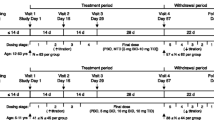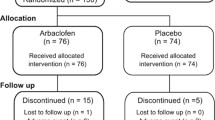Abstract
Rationale
Fragile X syndrome (FXS) is the most common inherited form of developmental disability and most common single gene cause of autism. Persons with FXS frequently exhibit irritable behavior marked by aggression, self-injury, and severe tantrums. Despite frequent clinical use of atypical antipsychotic drugs to target this behavioral cluster, no systematic trials to date have assessed the efficacy and safety of these drugs in persons with FXS.
Methods
We conducted a prospective open-label 12-week trial of aripiprazole in 12 persons aged 6–25 years (mean age, 14.3 years) with FXS who were free of concomitant psychoactive drugs.
Results
Aripiprazole use (mean dose, 9.8 mg/day) was associated with treatment response (defined by a Clinical Global Impressions-Improvement scale score of much improved or very much improved and a ≥25% improvement on the Aberrant Behavior Checklist-Irritability subscale) in 10 of 12 (87%) persons. Two individuals (13%) discontinued aripiprazole prior to study completion due to adverse events. One discontinuation was due to akathisia, mild drooling, and mild tiredness and the other due to moderate tiredness and moderate drooling. No significant changes in vital signs including weight or laboratory measures occurred during treatment with aripiprazole.
Conclusions
Aripiprazole was generally safe and well tolerated and was associated with significant improvement in irritable behavior. Given these findings, a double-blind, placebo-controlled study of aripiprazole in FXS is warranted.
Similar content being viewed by others
References
Aman MG, Singh NN, Stewart AW, Field CJ (1985) The aberrant behavior checklist: a behavior rating scale for the assessment of treatment effects. Am J Ment Defic 5:485–491
Amaria R, Billeisen L, Hagerman R (2001) Medication use in fragile X syndrome. Mental Health Asp Dev Dis 4:89–93
Bailey DB Jr, Hatton DD, Tassone F, Skinner M, Taylor AK (2001) Variability in FMRP and early development in males with fragile X syndrome. Am J Ment Retard 106(1):16–27
Bailey DB Jr, Raspa M, Olmsted M, Holiday DB (2008) Co-occurring conditions associated with FMR1 gene variations: findings from a national parent survey. Am J Med Genet A 146A(16):2060–2069
Berry-Kravis E, Krause SE, Block SS, Guter S, Wuu J, Leurgans S et al (2006) Effect of CX516, an AMPA-modulating compound, on cognition and behavior in fragile X syndrome: a controlled trial. J Child Adolesc Psychopharmacol 16(5):525–540
Berry-Kravis E, Potanos K (2004) Psychopharmacology in fragile X syndrome—present and future. Ment Retard Dev Disabil Res Rev 10(1):42–48
Burris KD, Molski TF, Xu C, Ryan E, Tottori K, Kikuchi T et al (2002) Aripiprazole, a novel antipsychotic, is a high-affinity partial agonist at human dopamine D2 receptors. J Pharmacol Exp Ther 302(1):381–389
Constantino JN, Davis SA, Todd RD, Schindler MK, Gross MM, Brophy SL et al (2003) Validation of a brief quantitative measure of autistic traits: comparison of the social responsiveness scale with the autism diagnostic interview-revised. J Autism Dev Disord 33(4):427–433
Erickson CA, Stigler KA, Posey D, McDougle C (2006) Managing maladaptive behaviors in fragile X patients. Curr Psychiatry 5(10):80–92
Erickson CA, Stigler KA, Posey DJ, McDougle CJ (2005) Risperidone in pervasive developmental disorders. Expert Rev Neurother 5(6):713–719
Erickson CA, Stigler KA, Posey DJ, McDougle CJ (2010) Aripiprazole in autism spectrum disorders and fragile X syndrome. Neurotherapeutics 7(3):258–263
Guy, W. (1976). ECDEU assessment manual for psychopharmacology, Publication No. 76-338. Washington, DC: U.S. DHEW, NIMH.
Hagerman RJ, Berry-Kravis E, Kaufmann WE, Ono MY, Tartaglia N, Lachiewicz A et al (2009) Advances in the treatment of fragile X syndrome. Pediatrics 123(1):378–390
Hatton DD, Hooper SR, Bailey DB, Skinner ML, Sullivan KM, Wheeler A (2002) Problem behavior in boys with fragile X syndrome. Am J Med Genet 108(2):105–116
Jordan S, Koprivica V, Chen R, Tottori K, Kikuchi T, Altar CA (2002) The antipsychotic aripiprazole is a potent, partial agonist at the human 5-HT1A receptor. Eur J Pharmacol 441(3):137–140
Lord C, Pickles A, McLennan J, Rutter M, Bregman J, Folstein S et al (1997) Diagnosing autism: analyses of data from the autism diagnostic interview. J Autism Dev Disord 27(5):501–517
Marcus RN, Owen R, Kamen L, Manos G, McQuade RD, Carson WH et al (2009) A placebo-controlled, fixed-dose study of aripiprazole in children and adolescents with irritability associated with autistic disorder. J Am Acad Child Adolesc Psychiatry 48(11):1110–1119
McCracken JT, McGough J, Shah B, Cronin P, Hong D, Aman MG et al (2002) Risperidone in children with autism and serious behavioral problems. N Engl J Med 347(5):314–321
McDougle CJ, Holmes JP, Carlson DC, Pelton GH, Cohen DJ, Price LH (1998) A double-blind, placebo-controlled study of risperidone in adults with autistic disorder and other pervasive developmental disorders. Arch Gen Psychiatry 55(7):633–641
Owen R, Sikich L, Marcus RN, Corey-Lisle P, Manos G, McQuade RD et al (2009) Aripiprazole in the treatment of irritability in children and adolescents with autistic disorder. Pediatrics 124(6):1533–1540
Roid G, Miller L (1997) Leiter international performance scale-revised. Stoelting Company, Wood Dale (Illinois)
Scahill L, McDougle CJ, Williams SK, Dimitropoulos A, Aman MG, McCracken JT et al (2006) Children's Yale-Brown Obsessive Compulsive Scale modified for pervasive developmental disorders. J Am Acad Child Adolesc Psychiatry 45(9):1114–1123
Shapiro DA, Renock S, Arrington E, Chiodo LA, Liu LX, Sibley DR et al (2003) Aripiprazole, a novel atypical antipsychotic drug with a unique and robust pharmacology. Neuropsychopharmacology 28(8):1400–1411
Shea S, Turgay A, Carroll A, Schulz M, Orlik H, Smith I et al (2004) Risperidone in the treatment of disruptive behavioral symptoms in children with autistic and other pervasive developmental disorders. Pediatrics 114(5):e634–641
Stigler KA, Diener JT, Kohn AE, Li L, Erickson CA, Posey DJ et al (2009) Aripiprazole in pervasive developmental disorder not otherwise specified and Asperger's disorder: a 14-week, prospective, open-label study. J Child Adolesc Psychopharmacol 19(3):265–274
Stigler KA, Posey DJ, McDougle CJ (2004) Aripiprazole for maladaptive behavior in pervasive developmental disorders. J Child Adolesc Psychopharmacol 14(3):455–463
Wechsler D (1999) Wechsler Intelligence Scale for Children, 3rd edn. Psychological Corporation, San Antonio (Texas)
Acknowledgments
This work is supported by a grant from the FRAXA Research Foundation (Drs. McDougle and Erickson). The work is also supported in part by The Division of Disability and Rehabilitative Services, Indiana Family and Social Services Administration (Drs. Erickson, Wink, McDougle); National Institute of Health grant KL2 UL1 RR025761 Indiana University Clinical and Translational Sciences Institute Career Development Award (Dr. Erickson); Daniel X. and Mary Freedman Fellowship in Academic Psychiatry (Dr. Stigler); NIMH grant K23 MH082119 (Dr. Stigler); and NIMH grants R01 MH072964, R01 MH077600, R01 MH083739 (Dr. McDougle). Bristol Myers Squibb provided drug for use in this study.
Author information
Authors and Affiliations
Corresponding author
Rights and permissions
About this article
Cite this article
Erickson, C.A., Stigler, K.A., Wink, L.K. et al. A prospective open-label study of aripiprazole in fragile X syndrome. Psychopharmacology 216, 85–90 (2011). https://doi.org/10.1007/s00213-011-2194-7
Received:
Accepted:
Published:
Issue Date:
DOI: https://doi.org/10.1007/s00213-011-2194-7




